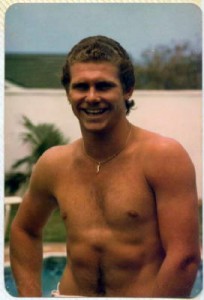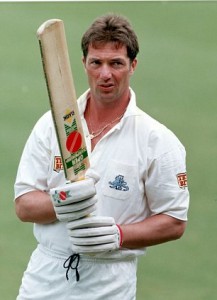
A gradual but inevitable descent into cricket-based loathing and bile.
One Of The Great What Ifs, #4: Gatting Doesn’t Rebel
The late 1980s were a turbulent time for England. The visit of the West Indies in 1988 became the summer of four captains – and England lost 4-0. Their scheduled winter tour to India then became a matter of controversy, due to the inclusion in their squad of several players who had previously played in South Africa. The entire series was cancelled and despite efforts to arrange a tri-series with New Zealand and Pakistan, there was no cricket that winter for England. The following summer saw David Gower reinstated to the captaincy and Ted Dexter given Chairmanship of the selectors’ committee, only for Allan Border’s Australia to triumph 4-0.
Several years later it was disclosed that the Ashes had been undermined by off-field shenanigans. Astonishingly there had been efforts to negotiate a second ‘rebel’ tour of South Africa, eight years after the first, however these attempts eventually faded into secrecy once it transpired that few players were willing to risk their England career for filthy lucre. That Ashes summer, England selected 29 different players., of whom only Gower and wicket-keeper Jack Russell played all six Tests. With the whole squad basically one big muddy puddle of uncertainty, no-one had a clue as to what England’s best team should be. There was also a loathsome mess in terms of leadership. The powers-that-be were certainly not unanimously in favour of Gower at the start of 1989 and by the end of the series, his tenure was finished. Was he sacked or did he resign? A bit of both, probably, but it allowed the TCCB to re-appoint Mike Gatting (whom insiders had suggested was the original first choice anyway, but that the start of the summer had been too soon after his sacking to reinstate him). And so Gatting lead his squad to the West Indies. It was a tough tour, particularly for the bowling attack that were more suited to Birmingham than Bridgetown (Derek Pringle, Steve Watkin, Angus Fraser and Neil Foster weren’t going to trouble anyone on quick wickets, and neither were the ancient spinners John Emburey or Eddie Hemmings). However the batsmen did better than expected, especially the middle order of Gatting, Allan Lamb, Robin Smith and Matthew Maynard.
The summer of 1990 was hot and the pitches of 1990 were flat. Bat dominated ball like no summer since. With Graham Gooch failing to recover his position in the team since his hand was broken in the Caribbean, young pretender Mike Atherton was asked to open along with Kim Barnett. Every match against India unsurprisingly finished in a high-scoring draw with Maynard grabbing headlines with his double hundred at Lord’s. But under Gatting England began to make progress. His leadership was instrumental in making Middlesex team-mates Angus Fraser and Phil Tufnell not only regular selections, but also match-winners. But as usual it was the batsmen who were the stars: Smith and Maynard were soon ranked in the top ten batsmen in the world as they plundered century after century both in the Ashes down under and famously in the home series against the West Indies in 1991. Gatting’s other quality was ensuring that his young team were united and that the aging trio of Botham, Gooch and Gower weren’t missed. All three found themselves outcast, never to play for England again. Whereas Gower and Botham retired and found themselves with media careers, Gooch kept on playing for Essex and as late as 2000 was still insisting he was available for international duty.
The England team became more settled with time, Gatting choosing a core group of players that would form his squad. With Mike Brearley replacing Dexter as Chairman of Selectors, the England set-up finally had the authority to dictate to the counties that they must do what suited England first, not what suited the counties. Hence in the summer of 1993 England were able to select just 12 players all series (Atherton, Alec Stewart, Gatting, Smith, Maynard, Graham Thorpe, Russell, Fraser, Chris Lewis, Phil DeFreitas, Tufnell and Devon Malcolm). Although previously regarded as fallible against spin, Smith had developed tremendously whilst touring India, so much so that he had the confidence to advance down the wicket to promising young leggie Shane Warne and smash his first ball through mid-wicket. Warne took a battering at Old Trafford from Smith and his confidence never fully recovered. Smith was the undoubted man of the series, particularly following his series-winning unbeaten 166 in the final game at the Oval.

His success turned Smith into a housewife’s favourite and also a gay icon, celebrated throughout the land as the archetypal modern sportsman. Somewhere in East London, a young David Beckham was taking notes.
Over the next two years, England managed to add new players to their team, including Darren Gough and Dominic Cork, both of whom provided more control than DeFreitas and Malcolm. On the batting front, Brearley and Gatting opted for what they knew best – ignoring the fragile Graeme Hick and instead instilling their Middlesex man Mark Ramprakash with the confidence to play his natural game. Gatting remained as captain until the end of the 94/95 Ashes (his third Ashes victory as captain), before retiring to tremendous adulation. Although his batting record was never world-class, his captaincy had taken England from the pits of the late 1980s to the second-best XI in the world by the mid-90s. Unsurprisingly everyone in the country agreed that Smith was the man to take over (aged 31, he was just about at the peak of his game and had shown remarkable level-headedness in his recent fame and publicity).

The first ex-cricketer to star on reality TV, Mike Gatting was an unsurprising winner of Great British Brew Off.
The rest writes itself: Smith was able to retire after the 1999 World Cup as by far England’s leading run-scorer in both forms of the game (including 8900 runs from 108 Tests); Maynard kept plundering runs for England until the early part of the next decade and was a star in the first few seasons of T20 cricket; Atherton replaced Smith as captain, but struggled to cope with a team in transition. Meanwhile, after a few years of media work, Gatting became England’s first ever batting coach and was promoted to head coach in 2009. Despite being the subject of a three-year terror campaign of poison pen letters, threats and personal attacks (ending finally in Gooch’s arrest in 2012), he still holds this position today.


No Comments
Post a Comment